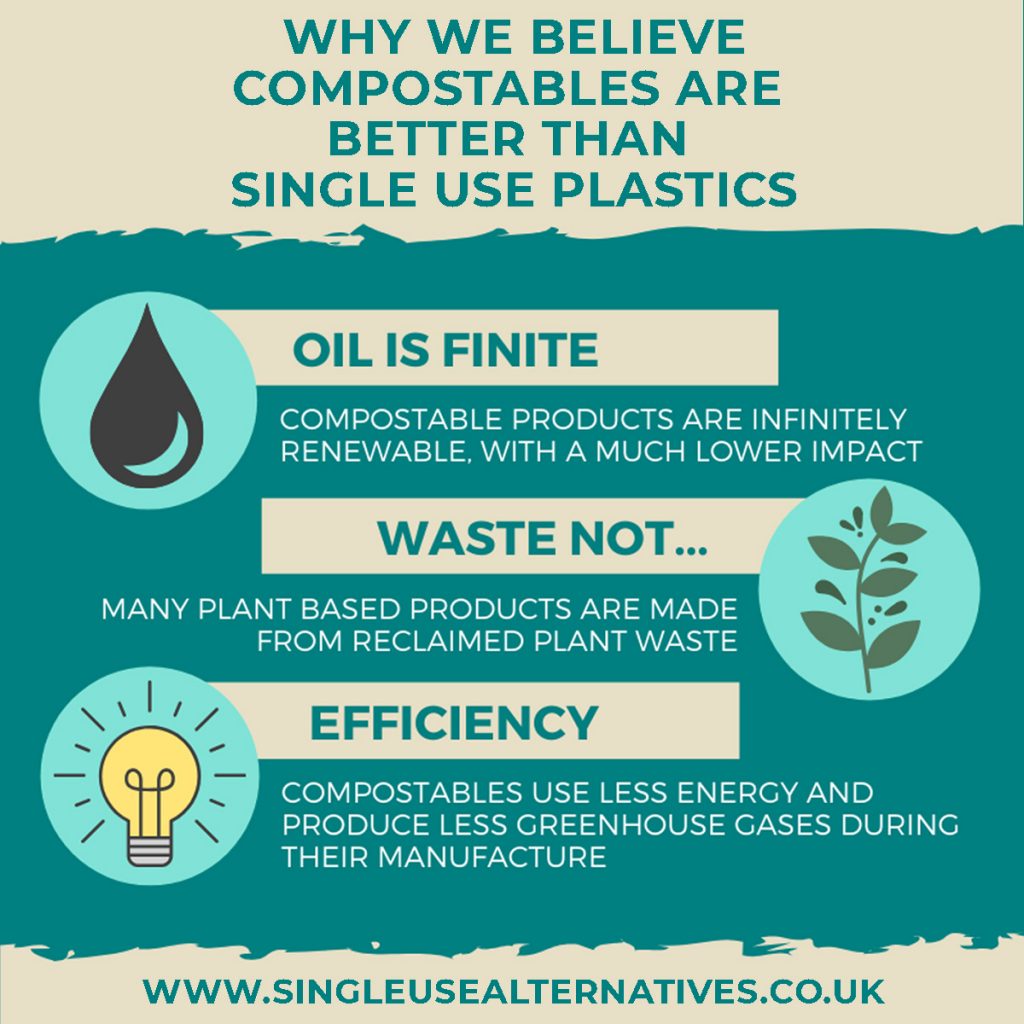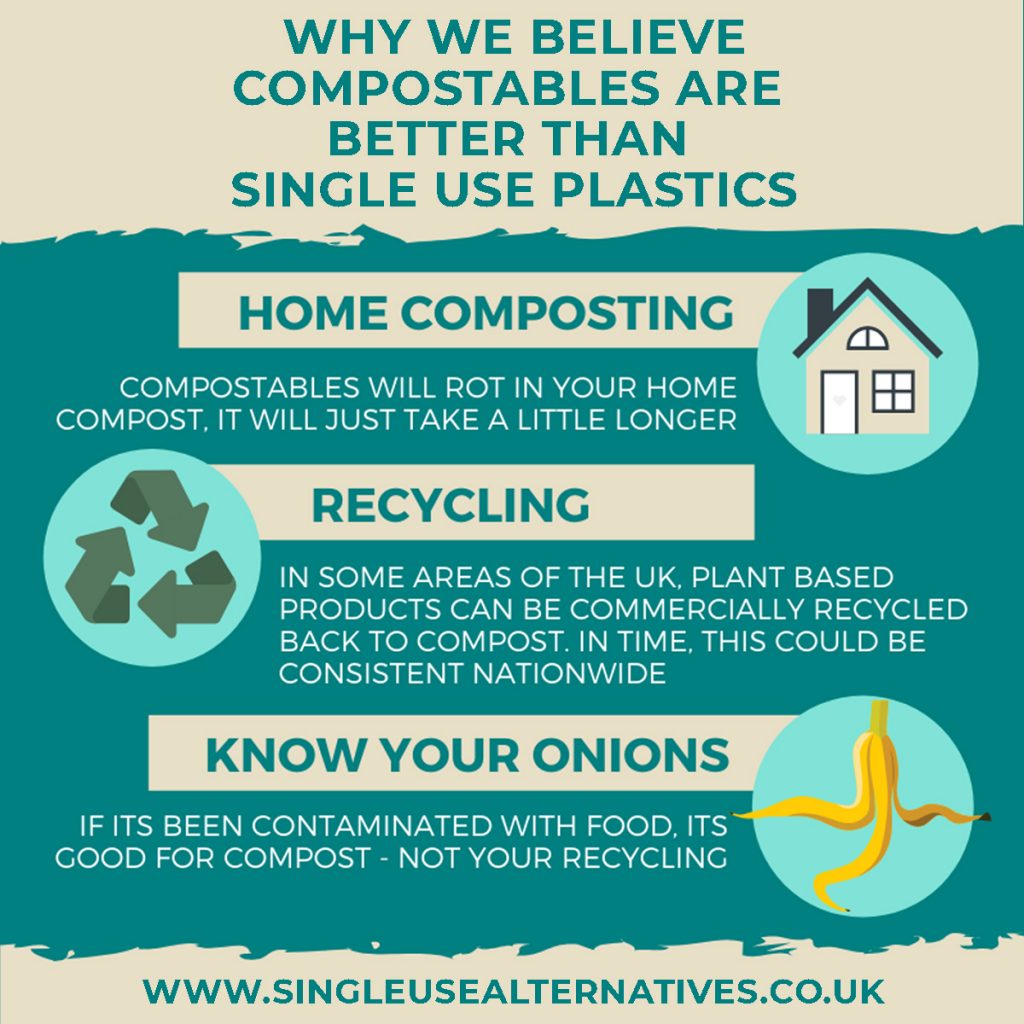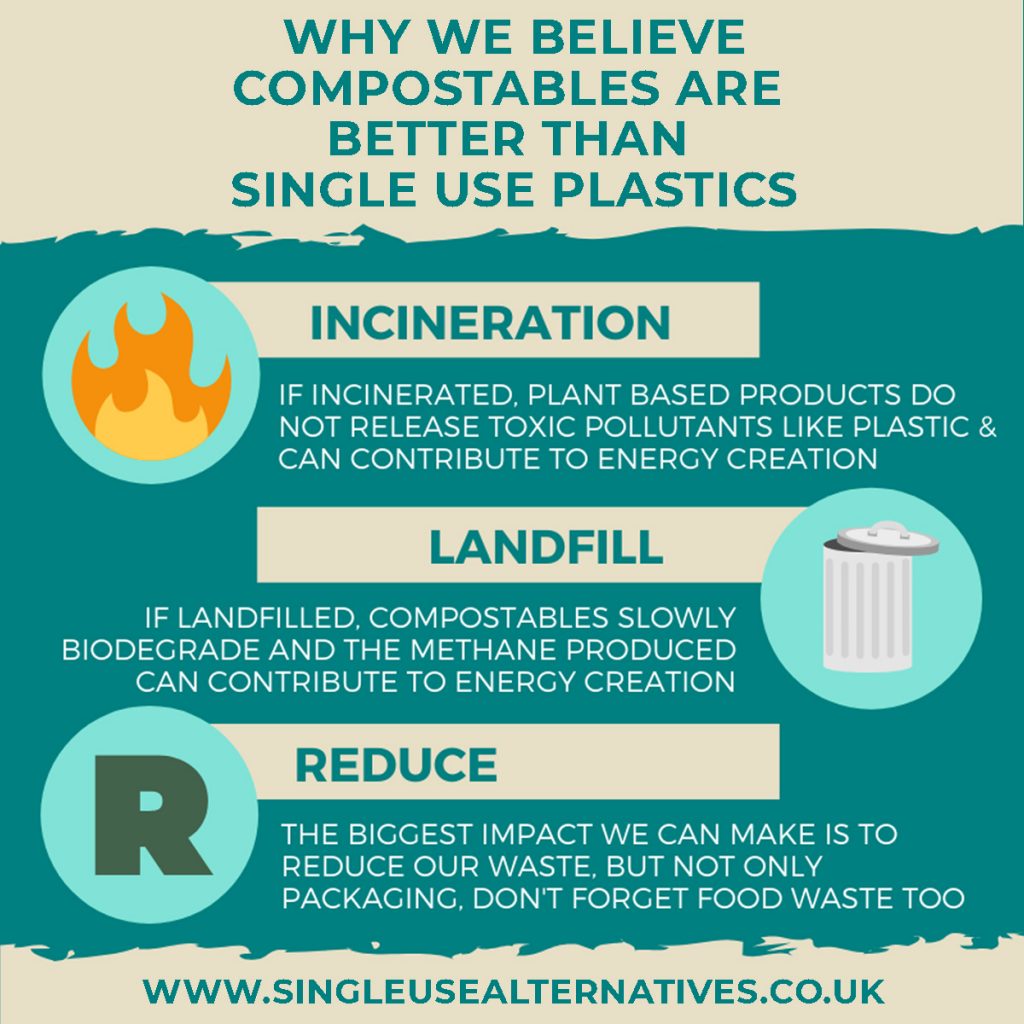It may come as no surprise that our opinion of single use plastics is, well, pretty low. Besides consuming Earth’s extremely limited resources to produce, they take thousands of years to break down and they poison our planet whether they’re incinerated, thrown into landfill or dumped on the land.
Modern society is currently completely reliant on the convenience that walks hand-in-hand with disposable products, from disposable coffee cups to take away food packaging, shopping bags to food wrap – we use plastic carelessly everyday. To change these buying habits and to alter our relationship with single use plastics will take a monumental shift in public perception and will inevitably take time, time we simply don’t have.
Plant-based, compostable products provide a less impactful, viable solution to this problem. As long as they are disposed of correctly, compostables do exactly what they say on the tin. You can read more here about how to make sure compostable and disposable products end up in the right place.
In this post we want to explore ten reasons why we believe plant-based compostables always offer a better alternative to single use plastic products.
Oil is finite
It is common knowledge that the vast majority of plastic, whether single use or otherwise, starts out life as one of Earth’s most valuable resources – Oil. Children are taught from primary school age about the ever-depleting fossil fuel resources that we relentlessly consume and so, where is the sense in continuing to manufacture such oil based products when there is a viable alternative?
‘Plastic’ is the name given to a particularly malleable group of organic polymers, in most cases they’re synthetic (or man-made) and derived from petro-chemicals (oil). These products generally take thousands of years to decompose in landfill, or they can disintegrate into tiny micro-plastics that make their way into the ground and watercourse, poisoning wildlife as well as humans.
Despite modern waste gas scrubbing they can release harmful gases into the atmosphere when they’re incinerated or alternatively, in the increasingly unlikely event that they truly do reach a recycling plant, the carbon footprint to recycle is large. However, it is more than possible to recreate similar polymers out of renewable, plant-based materials.
Waste not…
Plant-based, compostable-plastic products are manufactured from renewable biomass sources, our suppliers replace conventional oil based plastics with such materials. This could include recycled agricultural food waste and by-products; corn starch, vegetable fats, woodchip or sawdust. Some of the most common types of compostables are generally created from sugar derivatives such as starch, cellulose and hence polylactic acid – called PLAs.
PLA replaces the conventional plastic in coffee cup linings or sandwich windows, and it’s the clear material in cold cups and deli containers. Our hot cup lids and cutlery are made of a heat resistant version called CPLA. Whilst our burger boxes, plates and bowls are manufactured from reclaimed sugarcane fibres (known as bagasse). It performs really well, keeping heat in but not trapping condensation.
Plant based efficiency
The efficiency of plant-based plastics is twofold. Firstly, because they are manufactured from waste products, PLA is a constantly renewable material.. Secondly, the energy required to produce PLA is 65% less than petroleum-based plastics, and 63% fewer greenhouse gases are produced in the manufacturing process as well.
Home Composting
We’ve all heard of a compost heap, many of you will have a place to deposit vegetable scraps, fruit skins, some grass cuttings, paper & cardboard, eggshells or ground coffee – read more on the different types of composting here. Thanks to today’s innovative plant-based packaging products, the waste that we once didn’t give a second-thought about throwing into landfill will actually return to an organic state on your home compost heap.
Admittedly, it will take longer for compostables to break down at home when compared to the efficiency of industrial composting. For the average Joe, ensuring that the temperature, moisture and oxygen levels remain at a constant optimum is not realistic. But no matter, ‘cold’ composting at home is very effective, it just takes a while longer.
Recycling services
The infrastructure for ‘closing the loop’ in the UK is improving all the time, with many areas offering local collection or post-back schemes for food waste and compostable products. As a circular economy becomes more of a priority for UK councils in the near future, we will hopefully see a more consistent service for commercial composting nationwide. If your council doesn’t yet offer such a service, then your compostable packaging products must go in your general waste bin rather than your recycling. This way, they are more likely to be sorted at a Materials Recovery Facility, where they can be correctly disposed of.
Know your onions
Currently, disposables intended for serving food are largely sent to landfill or for incineration. Even if they’re made from recyclable materials, once contaminated with foodstuff – they cannot be recycled. Imagine if all of those pizza boxes, burger cartons and dirty cups didn’t go to landfill. Instead, imagine that the more cheese, ketchup, and leftover chips mixed with these disposables, the better.
This is exactly what ‘compostable disposables’ have been designed to do, mixed together with leftover food waste and recycled in an industrial composter. Making waste management much simpler for all manner of events that rely on disposable packaging products for food. Simply throw all compostable packaging, food waste, napkins and cutlery into the same bins, leaving non-compostable recyclables clean and ready to be recycled.
Incineration
As technology develops within the waste industry generally, incineration is becoming increasingly more efficient – even when burning PET plastics. But until commercial composting facilities are commonplace, we will still need to rely on the existing waste management methods used today. One of the many, many benefits of using plant-based plastics is that when incinerated, they do not emit the same toxic fumes that petroleum-based plastics are famous for. So in the event that compostable disposables do make their way to an incinerator, damage to the environment is further limited.
Landfill
It is important to note that landfill is designed to hold or store waste, and not designed to promote decomposition. This is even more prevalent in modern landfill sites, where temperature and moisture levels are governed to prevent waste from rotting and releasing toxic leachate into the soil. Dry waste like paper and compostable packaging only begins decomposition when water is added to it, whilst ‘juicy’ bin waste like food scraps or grass cuttings will slowly decompose on their own. Greenhouse gases like Methane are created as part of the decomposition process and if these gases were correctly tapped and collected, they offer a long-term renewable energy source for the future.
Refuse, Reduce, Reuse, Recycle and Rot
The biggest impact we can all make right now is to reduce the waste we create. Reduce our plastic waste, reduce our food waste and reduce our carbon footprint. This can seem like a difficult task at times, with some of us feeling the ‘well what difference will I really make’ argument. But go read our article on how to reduce your carbon footprint, offering simple choices that can make a real difference.
The five R’s are a framework for modern society to follow, emphasising both the importance of the need to refuse to buy products that use plastic needlessly, which will reduce how much single use plastic we use in our day to day lives. For the plastic products we do decide to buy, we refill and reuse these as many times as possible. When they reach the end of their life, recycle them correctly and finally, rot what we no longer need.
Financial Viability
During our Single Use Alternative journey, we have met with many fantastic businesses and like-minded individuals who are invested in the idea of replacing conventional disposables with compostable alternatives. The main cause for concern has been the cost, specifically whether compostables will affect their business profits. A very fair concern which we have aimed to allay from the outset.
Our business model is based around affordability, convenience and sustainability. Our buying consortium is growing all the time and as we purchase more items in bulk, we can make the cost per item as low as possible. We offer businesses a ‘no brainer’ swap to compostable products from their current plastic cups and food containers – costing the same or less, providing a convenient ordering and delivery service, all whilst making a positive impact on the environment.



